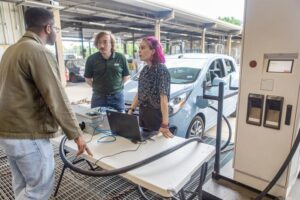£31m for AI in Southampton
New funding is part of £54m from government for UK universities to develop cutting-edge, secure and trustworthy AI research
Technology Secretary Chloe Smith announced the package of funding, to be delivered through UK Research and Innovation (UKRI), aiming to make the UK a science and tech superpower, fuel economic growth and create better paid jobs.
AI is, of course, big news at the moment. Positives of artificial intelligence include everything from delivering groceries by robot to safely decommissioning nuclear power plants. On the other hand, industry figures such as Geoffrey Hinton, so-called ‘godfather of AI’ have recently warned that this technology presents an existential risk to us all.
The government says it presents enormous opportunities in almost every aspect of modern life, particularly in addressing climate change challenges and pursuing net zero targets.
The £31m allocated to the University of Southampton will support groundbreaking research into responsible and trustworthy AI. Uniting expertise from academia, business and the wider public, the team will explore how responsible AI can be developed and used, while considering its broader impact on wider society.
Gopal Ramchurn is Professor of Artificial Intelligence at the University of Southampton and principal investigator for Responsible AI UK. He says: ‘We don’t need to fear artificial intelligence, it won’t threaten humanity but has huge potential to influence how society operates in the future.
‘AI should not only be technically safe and accountable, but its impact on its users, their well-being and rights, and the wider society needs to be understood for people to trust it. Our role in RAI UK will be to bring together experts from diverse disciplines and cultures from across the world to address the most pressing AI challenges in key sectors and ensure we all benefit from the productivity gains it promises to deliver.’
Dame Wendy Hall, computer scientist and Regius Professor at the University of Southampton, adds: ‘AI will change the way we live and work for the better – but an interdisciplinary approach to regulation and safe AI is vital.’
The remaining £13 million will be used to fund 13 projects based at other UK universities to develop pioneering AI innovations in sustainable land management, efficient CO2 capture and improved resilience against natural hazards.
Technology Secretary Chloe Smith, says: ‘Despite our size as a small island nation, the UK is a technology powerhouse. Last year, the UK became just the third country in the world to have a tech sector valued at $1 trillion. It is the biggest in Europe by some distance and behind only the US and China globally.
‘The technology landscape, though, is constantly evolving, and we need a tech ecosystem which can respond to those shifting sands, harness its opportunities, and address emerging challenges. The measures unveiled today will do exactly that.
‘We’re investing in our AI talent pipeline with a £54 million package to develop trustworthy and secure artificial intelligence and putting our best foot forward as a global leader in tech both now, and in the years to come.’
The Tech Secretary also announced the UK Geospatial Strategy 2030, which aims to unlock billions of pounds in economic benefits by harnessing location data through technologies including AI, satellite imaging and real-time data.
These new commitments follow the announcement in March of £117m for Centres for Doctoral Training in AI, with a further £46m to support Turing AI Fellowships that will develop the next generation of top AI talent.
The Department for Science, Innovation, and Technology will also shortly launch an open call for proposals to pilot new, collaborative approaches to scientific research in the UK, backed by £50m in government funding. This money will drive investment as well as partnerships with industry, providing finance for ideas and innovations that aren’t currently addressed in the UK research sector.
Professor Dame Ottoline Leyser, Chief Executive of UK Research and Innovation says: ‘UKRI is investing in the people and technologies that will improve lives in the UK and around the world. By supporting research to develop AI that is useful, trustworthy and trusted, we are laying solid foundations on which we can build new industries, products and services across a wide range of fields.
‘Working though cross-disciplinary partnerships we will ensure that responsible innovation is integrated across all aspects of the work as it progresses.’
The measures announced today will fuel the government’s mission to make the UK the most innovative economy in the world and build a technology ecosystem which cements the UK’s place at the frontier of global tech development.’
In related news, earlier this year, the Department for Science, Industry and Technology (DSIT) accepted the first science, engineering and technology experts on a new secondment scheme that aims to strengthen links between the tech sector and government.
Photo by Maximalfocus

















Leave a Reply